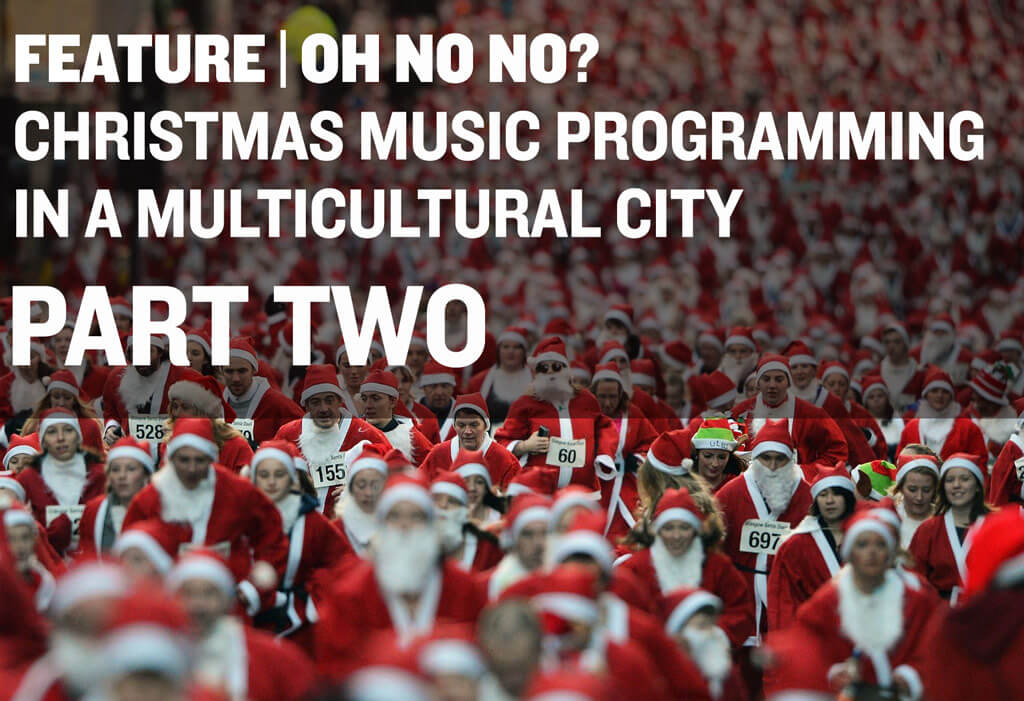
Part Two: Since Multiculturalism
[For Part One, See Here.]
Though The Messiah and Christmas Carol concerts still predominate in December, things are changing. There are more “winter holiday” or “winter solstice” concerts and groups are expanding their focus. The Amadeus Choir deserves a lot of credit for updating their International Songwriting Competition, which for 29 years solicited “songs celebrating the stories of Christmas and Chanukah,” but this year invites “works based on texts reflecting universal goals of peace, inclusion, understanding and generosity of spirit.” Such values seem especially meaningful in a multicultural city.
I realized after chatting with people from different faiths, that their feelings about Christmas music were different from mine, for a variety of reasons. Whether they loved Christmas music or were indifferent to it, nobody objected to the amount of it performed each December.
My Hindu acquaintance, who was born in India, then grew up in the United States, told me that at Christmas she would go caroling with Christian and Jewish classmates. The Jews were very secular and assimilated, and had no problem singing these songs. Furthermore, she explained, Gandhi believed in studying other religions and cultures as part of his search for the truth and read The New Testament. Concepts from Buddhism, Christianity, Islam, and Theosophy can be found in Gandhi’s thinking. Engaging with other cultures through music or thought poses no problem to Hindu observance.
The Muslim’s I spoke with were born here, but their parents had grown up in countries where Christianity was not the majority faith. There was an established clear separation between the faiths, with relaxed interaction, including attending Christian schools. Here, Christianity doesn’t have a strong presence in their awareness, and Christian music isn’t especially intrusive. There is no equivalent winter solstice holiday due to the nature of the Muslim lunar calendar, so there is no sense that one holiday is being overshadowed by another. By the time they entered the school system in Toronto, the Lord’s Prayer, and Bible reading had been removed, and the curriculum was secular. Christmas is just someone else’s holiday, as much as Chanukah and Diwali.
The most enthusiastic non-Christian lover of Christian music I spoke with is Darius Bagli, who is Zoroastrian. A prominent M.D. and a virtuosic pianist who believes in the healing power of music, (you can catch his performance of Chopin Scherzo #2 in B Flat Minor, here). Bagli explained to me that the first Zoroastrian Society in Canada was in Quebec, where his father, Jehan Bagli, an ordained Zoroastrian Priest, (and an organic chemist in his day job) was the President. Zoroastrians began arriving in Canada in the Sixties, and approximately 5000 of the 300,000 Zoroastrians world-wide, now live here. The world’s oldest existing monotheistic religion, originating in Persia, it may have been the inspiration for other world monotheistic religions, including Judaism, and the Three Magi in the Christmas Story may have been Zoroastrians. Its three core tenets are good thoughts, good words, and good deeds, and according to Bagli, this entails a “respect and recognition of other religions.” There is no impediment to a wholehearted embrace of sacred music, be it Christian or any other kind.
“Christmas music is part of my blood, I’ve performed it in Churches, and at weddings, I’ve blasted Christmas music on my sound system, it’s a part of my own musical heritage even if it isn’t from my religion,” he stated quite passionately. “Even though the words tell the Christmas story, I don’t really listen to the words. Music is a universal language in and of itself, and the world religions share universal values, even if they have different manifestations. I like to say that Christians don’t have the lock on Christmas.”
Without venturing too deeply into comparative religion, it’s safe to say that doing good deeds is valued in many faiths. It is also one of the three core tenets of Judaism. As for Bagli, performing music for others is one meaningful way for Toronto lawyer and advanced amateur pianist Gilda Berger to fulfill that tenet. On Christmas Eve she plays carols for the homeless people who find shelter at the Out of the Cold Program at her synagogue, and she performs Christmas music at her local food bank, where her audiences are very grateful.
In her Facts and Arguments essay, Berger describes her childhood discomfort with Christmas, in Winnipeg, circa 1960: “ In elementary school, I dreaded the approach of Christmas and the mandatory participation in the choirs…I’d carefully mouth all the key words I felt might compromise my status in my own religion – Jesus, Mary, saviour, manger, herald angels.” But today, without reservation, she wholeheartedly embraces “the generosity, the hopefulness and positive wishes that come with the season.”
One reason she thoroughly enjoys playing her repertoire of Christmas Carols, is that she finds them very beautiful. She and Bagli both feel that it would be a shame to restrict Christmas music to Christians.
There are many fine minds tackling the challenges of multiculturalism, so I defer to thinkers such as Erna Paris and Ian Buruma. If I could wave a magic wand, we would have December programming that retains the beloved sacred favorites of Christmas well as great music from other traditions, even if the compositions are not specifically about December holidays. However many cultures remain or arrive in Toronto, December will always be cold and dark, and our concert venues could be places to warm up and cheer up to the sound of music, no matter what our religious backgrounds may be.
#LUDWIGVAN
Want more updates on Toronto-centric classical music news and review before anyone else finds out? Follow us on Facebook or Twitter for all the latest.



